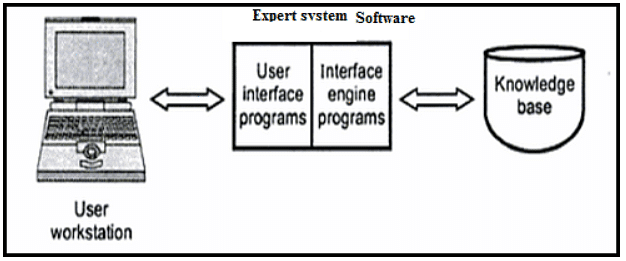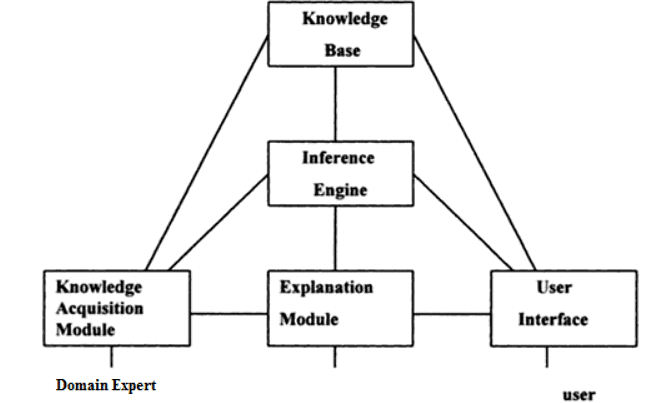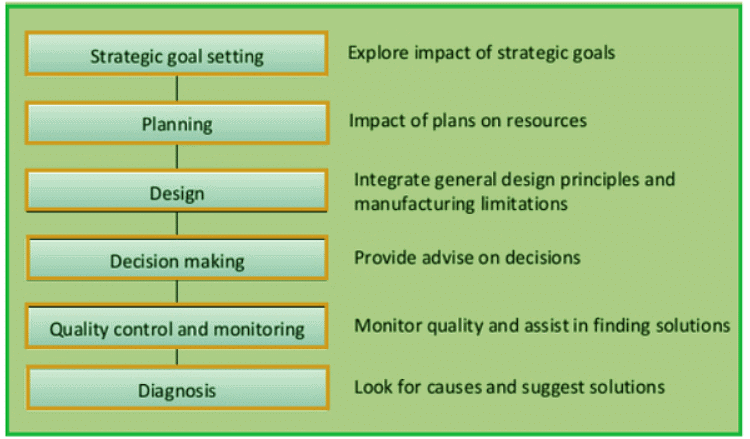Expert Systems | Management Optional Notes for UPSC PDF Download
| Table of contents |

|
| Introduction |

|
| Understanding Expert Systems and Knowledge Acquisition |

|
| Interactive Roles and Evolution of Expert Systems |

|
| Early Models |

|
| Application of Expert Systems |

|
Introduction
- An expert system is a type of information system that enables a computer to provide recommendations and operate as an expert in a particular field, assisting and enhancing the performance of novice users. Essentially, it is a knowledge-based information system that leverages its expertise in a specific domain to serve as a knowledgeable advisor to users. Falling under the umbrella of Artificial Intelligence, expert systems focus on aiding non-experts in solving intricate problems in a manner akin to experts.
- The notable advantage of expert systems lies in their ability to capture and utilize the knowledge of specialists and experts within organizations. This ensures that valuable experience and specific skills are not lost when a human expert departs due to retirement, job changes, or other reasons. For instance, the U.S. Army employs the Knowledge and Information Fusion Exchange (KnIFE) expert system, which supports soldiers in making informed military decisions based on successful past engagements. The knowledge base of an expert system encompasses a compilation of data, rules, procedures, and relationships essential for achieving value or the desired outcome.
Understanding Expert Systems and Knowledge Acquisition
- An expert system is a software application that incorporates insights gathered from experts in a specific field, utilizing their knowledge to offer problem analysis to users. Essentially, these systems are computer applications that integrate hardware, software, and specialized information to replicate expert human reasoning and guidance. Falling under the realm of artificial intelligence, expert systems provide domain-specific advice and explanations to users, functioning most effectively with specific tasks or problems and a distinct database of digitized facts, rules, cases, and models. Expert systems find widespread applications in commercial and industrial settings, spanning areas such as medicine, finance, manufacturing, and sales. Knowledge holds a crucial role in the development of expert systems.
- Several studies in the expert system literature highlight the significance of knowledge. Wu et al. (2000) emphasize that the quantity and quality of knowledge bases are critical factors affecting the performance and reliability of knowledge-based systems. They discuss the development of knowledge acquisition tools to support the construction of knowledge bases. Similarly, Cheung et al. (2004) introduce an agent-oriented and knowledge-based system for strategic e-procurement, aiming to capture and leverage enterprise knowledge for generating dynamic business rules. Diamantidis and Giakoumakis (1999) present a tool combining interactive knowledge acquisition tools and machine learning methods, allowing experts to evaluate an expert system.
- An expert system comprises four main components, as outlined by Bagad (2009):
- User Interface
- Knowledge Base
- Interface Engine
- Development Engine
Component of expert system

- An expert system is a computer program equipped with a set of rules designed to analyze information, typically provided by the user, pertaining to specific problems. It then suggests one or more courses of action and may also offer mathematical analyses of the problem. This system employs apparent reasoning capabilities to draw conclusions. Functioning as a software program, the expert system combines a searching and sorting program with a knowledge database. The specific program responsible for searching and sorting in an expert system is known as the inference engine, housing systematic processing rules and logic for the given problem or task. Mathematical probabilities often underlie many expert systems.
- The second vital component, the knowledge database, stores essential factual, procedural, and experiential information representing expert knowledge. Through a process of knowledge transfer, expertise passes from human experts to knowledge engineers. These engineers create and structure the knowledge database by undertaking logical, physical, and psychosocial tasks. In this context, expert systems are referred to as knowledge-based information systems. By disseminating human expertise, businesses can achieve success in maintaining consistency, accuracy, and reliability in problem-solving activities. The knowledge base serves as a natural extension of databases, information systems, and decision support systems.
Interactive Roles and Evolution of Expert Systems
- Expert systems engage in four interactive roles, encompassing activities such as diagnosing, interpreting, predicting, and instructing. These functions are executed by applying rules and logic specified by human experts during system creation or maintenance, or determined by the system itself through the analysis of historical precedents.
- Instruction results from the expert system's justification system, synthesizing feedback through diagnostic, interpretative, and predictive programs. This synthesis enables expert systems to function as finely tuned personal tutors, contributing to the field of Computer-Aided Instruction (CAI) for businesses.
Early Models
- Historically, expert systems emerged in the mid-1960s as a product of artificial intelligence research, rooted in Cognitive Science, which combines AI and psychology to study the human mind. Expert systems represented the first successful applications of AI to real-world problem-solving in fields like medicine, chemistry, finance, and space exploration (e.g., the Space Shuttle and robots on other planets). Notably, the DENDRAL system, developed at Stanford University in the 1960s, was an early expert system designed to infer the structure of organic molecules using heuristic knowledge applied to a large search space.
- Several early systems, including GPPS, XCON at Digital Equipment Corp., and CATS-1 at General Electric, introduced the concept of a computer expert. However, MYCIN, developed at Stanford University to support bacterial meningitis diagnosis, notably introduced two essential features: modularity and justification. MYCIN's modular design allowed it to explain its own advice.
Building a Knowledge Base
- The fundamental role of an expert system is to replicate a human expert in problem-solving activities. This requires transferring crucial information from a human expert into the knowledge database and, when applicable, the inference engine. Two types of knowledge are derived from the human expert: facts and procedural or heuristic information. Facts encompass definitively known data and defined variables, while procedures capture the if-then logic used by the expert.
- The development of expert databases involves a formal knowledge acquisition process, including identification, conceptualization, formalization, implementation, and testing. Methods such as interviews, transactional tracking, observation, case studies, and self-reporting are employed to extract information. Through the integration of logic, data, and decision-making rules, expert systems analyze and interpret data input to arrive at suggested results.
Architecture of good expert system

Representation of Knowledge in Expert Systems
Expert systems employ various methods to represent knowledge:
- Case-based reasoning: Knowledge is stored in the form of cases in the expert system's knowledge base.
- Frame-based knowledge: Information is organized hierarchically or in a network of frames. A frame comprises a collection of knowledge about an entity, including data values describing its features.
- Object-based knowledge: Knowledge is portrayed as a network of objects, where an object is a data element encompassing both data and the methods or processes acting on that data.
- Rule-based knowledge: Information is represented through rules and factual statements. Rules typically consist of a premise and a conclusion, taking the form of "IF (condition), Then (conclusion)."
- Software resources: Expert system software packages incorporate an inference engine and other programs for refining knowledge and interacting with users. The inference engine processes problem-specific knowledge, making associations and inferences to recommend courses of action. User interface programs, including an explanation program, are necessary for communication with end-users and elucidating the reasoning process upon request.
Capabilities of Expert Systems
Expert systems exhibit several capabilities, including strategic goal setting, exploring the impact of strategic goals, planning the impact of plans on resources, integrating general design principles, and designing manufacturing processes. These systems provide unique decision support capabilities.
Application of Expert Systems
- Expert systems are specifically designed to support activities in various fields such as accounting, medicine, process control, financial services, production, and human resources. Their practical applications, however, have been limited despite their recognition in artificial intelligence research.
- Today, there is a growing use of expert systems in the business world, with applications ranging from security and capacity planning for information systems to military analysis, map construction, law enforcement, and more. Expert systems contribute to tasks like diagnosis, mineral search, compound analysis, repair recommendations, and financial planning.
- From a strategic business perspective, they enhance every step of the product cycle, providing cost-effective solutions, consistent advice, and reduced errors.
Benefits and Costs
- Expert systems capture and archive rare expert knowledge, improving employee productivity by offering valuable assistance for decision-making. They enhance reliability and quality by distributing expert advice on demand, especially in complex tasks.
- Expert systems are adept at modeling human activities and problems, decreasing production downtime, increasing output and quality, and enabling expertise transfer to remote locations through digital communications.
- However, the costs of expert systems, including post-development expenses like training and maintenance, can be significant. Hardware and programming considerations, ongoing knowledge database updates, and the identification and employment of human experts add to the expenses. Poor design or inadequate knowledge modeling may lead to failed cost recovery.
Disadvantages of Expert Systems
While expert systems offer consistent answers for repetitive decisions, they lack common sense, creativity, and adaptability to changing environments. They may not handle creative responses in unusual circumstances as human experts do, and errors in the knowledge base can lead to incorrect decisions. Additionally, domain experts may struggle to clarify their logic and reasoning within the system.
Management Perspective
Expert systems are crucial for organizations with expertise that is challenging to transfer. They transmit intelligence and information from experts to aid other members in problem-solving. Expert systems are best suited for problems without a single "correct" solution that can be encoded in a conventional algorithm. These systems can handle real-world uncertainties using methods like fuzzy logic, making them valuable in situations where straightforward algorithms are insufficient.
Conclusion
In Conclusion, an expert system functions as a knowledge-based information system, utilizing its knowledge to act as an expert consultant. Its main components include a knowledge base and software modules. According to management studies, an expert system is an intelligent computer program capable of performing complex tasks in various fields at the expertise level of humans. When well-developed, even individuals with minimal computer experience can operate an expert system. The system poses a series of questions to the user, and based on the responses, it generates conclusions.
FAQs on Expert Systems - Management Optional Notes for UPSC
| 1. What are expert systems? |  |
| 2. What is knowledge acquisition in the context of expert systems? |  |
| 3. How do expert systems interact with users? |  |
| 4. How have expert systems evolved over time? |  |
| 5. What are some applications of expert systems? |  |



















